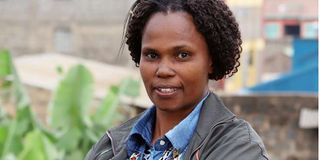Happening Now: Labour Day celebrations at Uhuru Gardens
Woman who gave kidney to her brother speaks on donating organs

Rachel Wangui, a 42-year-old mother of three who donated her kidney to her brother.
What you need to know:
- Wangui could not stand to see her brother suffer after a kidney donated to him by her younger sister failed.
- She says she would not mind giving her other body parts if she is declared brain-dead.
- But she will have to wait longer before pledging her body parts to be harvested to help other people.
- This is because the law that supports organ donation upon death is still not operational in Kenya.
Would you write a will declaring that you would want your organs harvested upon your demise? This is a question Rachel Wangui, a 42-year-old mother of three, answered quickly with a straight and strong yes.
Ms Wangui is a kidney donor and says she would not mind giving her other body parts if she is declared brain-dead.
“If I have donated while still alive, why not donate others upon my death? Yes, I can declare that they harvest all the organs which may be good so as to help others in need. At the end of the day, will my body be useful? It will just be buried,” she said during an interview with the Nation.
Ms Wangui donated one kidney to her brother, Mr Samuel Karoki, towards the end of 2019.
Unlike many who would see organ donation upon death as an alien concept, she is open to the idea. As the world celebrated World Organ Donation Day last Thursday, her message was clear: “Do not fear to donate to save a life, if you can.”
Risking for love
She could not stand to see her brother suffer after a kidney donated to him by her younger sister failed almost 10 years later.
“I needed to save my brother. I wanted him to have a long life considering that he had a young family. I looked at the small children and I decided that I wanted to risk my life for their sake,” she said.
During the interview, she said she and her sister are doing just fine after donating their kidneys.
Ms Wangui is one of the increasing number of living donors, mostly family members, whose generosity has enabled their kin to live longer.
But she will have to wait longer before pledging her body parts to be harvested to help other people. This is because the law that supports organ donation upon death is still not operational in Kenya.
Daily Nation met with Mr Karoki at Mediheal Hospital in Parklands where he had gone for check-up and also to pick some immunosuppressant drugs.
Twice lucky
Having been lucky twice and thankful for his sisters’ generosity, he expressed concern that many patients are suffering for lack of people willing to donate their organs. Many rely on dialysis, an expensive procedure, to keep going.
When his first donated kidney failed last year, nine years after the first one also failed, he had to go back to dialysis before Ms Wangui came forward and decided to donate one of her kidneys to him.
“Going back to dialysis was something which I could not imagine. But I was lucky that another sister agreed to give me a kidney,” he said.
“Doing a second kidney transplant is not easy because chances of it being rejected are quite high according to doctors. It was quite an expensive process of doing plasmapheresis,” he said.
This is the process where the liquid part of the blood, or plasma, is separated from the blood cells. He explained that a session goes for up to Sh250,000 and he did two of those and that more tests were done compared to when he underwent the first transplant. This was to make sure that his body does not reject the second kidney.
To protect the new kidney, doctors at Mediheal in Eldoret, where surgery was done in November last year, had to remove the old one, another surgery by itself, forcing him to have two surgeries almost at the same time.
A similar story is told by Mr Nicholas Mungai, a Kiambu resident who underwent a transplant in May 2019 at Mediheal, Eldoret.
“I received a kidney from my sister and it has improved my life. I could not walk without a walking stick when I was undergoing dialysis but I now walk freely,” he said.
While the two may be lucky to have had relatives who donated their kidneys to them, tens or even hundreds of others do not have anyone to help them, based on several reasons including lack of relatives who are fit to make the donations and family history.
Best alternative
Their surgeon, Dr A. S Murthy, in an interview, said while the law in Kenya still does not allow for organ harvesting, it is the best alternative in saving thousands of patients in need. It is a practice which is ongoing under strict laws and regulations in India and elsewhere in the world, where thousands of Kenyans flock every year to get such critical surgeries like kidney and liver transplants.
“You can make a pledge to donate organs when you are dead to be used on other people in need,” he said.
But the law on organ donation and transplantation is not operational, said Dr John Ngigi, the head of the Renal Unit at Kenyatta National Hospital (KNH).
While the Health Act of 2017 allows for organ harvesting in brain-dead patients where there is a will or under special circumstances, patients requiring organ transplant will have to wait for longer before they can benefit from it.
According to Dr Ngigi, there is great need to increase the donor pool in the country by applying medical technologies to accommodate transplantation across blood groups, family lines and to avoid situations like kidney rejection.
“With robust legislation, we can be able to get a donation programme. The Health Act (2017) needs to be operationalised,” he said, adding that there is need for a Transplantation Service Bill.
Dr Antony Were, the deputy director at the University of Nairobi’s East Africa Kidney Institute said, “We spent so many months formulating the Act. It was ready to be taken to Parliament but blood transfusion services and organ transplantation were separated. This is the time we need those services because India is closed. All we need is law and we will be good to go,” he said.
“It is easier to transplant than to have dialysis, especially because of financial constraints. It is immoral to put patients on dialysis if they are transplantable,” said Dr Ngigi.
KNH has done at least 200 kidney transplants in the last 10 years.
And at Mediheal, at least 80 patients have had kidney transplants in the last two years.
“You do not need to go to India, you can get a kidney transplant in Kenya. This will help reduce expenses,” said Dr Murthy.
Drugs after transplant
NHIF caters for Sh500,000 during transplantation which costs between 750,000 and Sh1 million in participating public hospitals.
At Mediaheal, the cost is Sh1.6 million, far less than the amount spent by a patient going to seek the same service in India, said Dr Murthy.
It ranges from Sh1.6 million to around Sh3 million to have a transplant in many private hospitals in the country.
According to Dr Ngigi, many patients are going back to dialysis because they cannot afford essential drugs despite transplant being the best option.
Just like transplantation, dialysis is catered for by NHIF unlike medication, which must be catered for by the patient.
This situation may force transplant beneficiaries to go back to dialysis for lack of money to buy the drugs.
For example, Mr Karoki spends at least Sh35,000 a month on his drugs while Mr Mungai spends at least Sh20,000.





